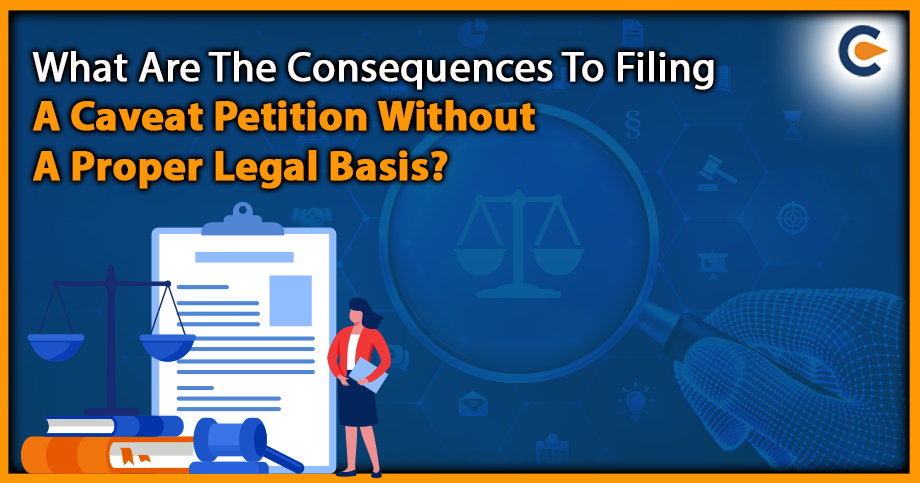Caveat is a Latin term that means “let a person beware” and is often used to warn against a particular course of action. In the context of law, a caveat petition is typically filed to prevent the grant of probate or letters of administration in an estate matter or to challenge a proposed sale of property. It is typically filed in a court or registry, and it serves as a formal notice or warning that there may be a dispute or objection to the proposed action. A caveat petition should always be in writing, and it should clearly state the grounds for the challenge or objection to the proposed action, along with any relevant evidence or supporting documents.
What is a Caveat Petition?
A caveat petition is a legal document or plea filed in a court or registry to challenge a proposed action or decision. It must be in writing to be considered valid. The caveat petition should clearly state the grounds for the challenge or objection to the proposed action, along with any relevant evidence or supporting documents. It is important to ensure that the language used in the caveat petition is clear and concise and that it complies with any requirements or guidelines set out by the court or registry in which it is being filed. The purpose of a caveat petition is to provide notice to the court or registry of a potential dispute or objection to a proposed action and to allow the person filing the caveat to have their interests considered before any decision is made. Top of Form
Duration of Caveat Petition
A caveat is typically filed to prevent a particular action or proceeding from being taken without notice to the person who filed the caveat. For example, a caveat may be filed to prevent the issuance of a marriage licence without the person who filed the caveat being notified. In this instance, the caveat would be in effect up until the issuance of the marriage licence or until the court withdraws or sets aside the caveat. Similarly, in the context of property transactions, a caveat may be filed to prevent a sale or transfer of property without the person who filed the caveat being notified. The duration of the caveat would typically be until the sale or transfer is completed, the caveat is withdrawn, or the court sets aside the caveat.
However, the validity of a caveat petition depends on the specific laws and regulations of the jurisdiction in which it is filed. In general, a caveat petition is valid until the person who filed it withdraws it or the court decides whether to rule on it. If the court upholds the caveat, it may continue to be in effect for the time period required by law. If the court denies the caveat, it will be dismissed and no longer have any legal effect. In some jurisdictions, a caveat petition may have an expiration date. For example, in some states in the United States, a caveat petition is valid for a set period of time, such as six months or one year, after which it must be renewed or it will expire. This is intended to prevent indefinite delays in the probate process. In other circumstances, the caveat’s duration may be indefinite, meaning that it will remain in effect until the court withdraws or sets it aside.
In India, as per clause 5 of Section 148-A of the Code of Civil Procedure, 1908[1], once a caveat petition is filed; it remains valid for a period of 90 days. If any application is filed within the period of 90 days, then it is the duty of the applicant as well as the court to give notice of the same to the caveator. But if no application is filed after 90 days, then no one is required to notify the caveator about it.
Consequences of Expiration of Caveat
If a caveat expires, it will no longer be valid, and the action or proceeding that it was intended to prevent may proceed without further notice to the person who filed the caveat. For example, if a caveat was filed to prevent the issuance of a marriage licence, but the caveat expires before the marriage licence is issued, the marriage licence may be issued without further notice to the person who filed the caveat.
In India No one is needed to inform the caveator if no application is submitted within the required 90 days; the caveat is void if an application is submitted after the required 90 days have passed. The caveat petition must be valid for the following 90 days, but if the caveator still wants to be alerted to the issue that has been or is about to be filed, a new caveat must be presented.
The expiration of a caveat does not necessarily mean that the underlying issue or dispute has been resolved. In some cases, the expiration of a caveat may simply mean that the person who filed the caveat was unable to obtain a permanent injunction or other legal remedy to prevent the action or proceeding.
Conclusion
In conclusion, a caveat petition is valid until the person who filed it withdraws it or the court decides whether to rule on it. The length of time that a caveat petition remains valid can vary depending on the jurisdiction in which it is filed and the specific circumstances of the case. It is important to seek the advice of a local attorney if you are considering filing a caveat petition or if you have questions about the validity of a caveat petition that has been filed against you.
Read Our Article: What Is The Validity Of A Caveat In India?











